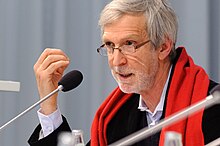National State Law (Israel)
The Basic Law: Israel - The National State of the Jewish People ( Hebrew חוק יסוד: ישראל - מדינת הלאום של העם היהודי), commonly referred to as the nation state law , also the national law or nationality law , is a law of the State of Israel that defines the Jewish character of the state and anchors the national values of the State of Israel in a legally binding manner. As one of Israel's basic laws , the law is part of the country's constitution. It stipulates that Israel is the "national home of the Jewish people" and that united Jerusalem is the capital. Hebrew is declared the sole national language, while Arabic, which has also been an official language in Israel up to now, only received an unspecified special status. It is also emphasized that Jewish settlements in Israel are in the interests of the nation state. The law was introduced by Avi Dichter ( Likud ) and other MPs and passed in the Knesset on July 19, 2018 after an eight-hour debate with 62 votes in favor, 55 against and 2 abstentions . This was preceded by years of debate; Avi Dichter first introduced the bill in 2011. The nation-state law sparked heated controversy: For Prime Minister Netanyahu, the passage of the law is a "key moment in the history of Zionism and the State of Israel". Israel is the state of the Jewish people, which at the same time respects the civil rights of all residents. Arab MPs, however, condemned the law.
Content of the law
The nation-state law contains eleven articles.
- 1. Basic principles
The Land of Israel, in which the State of Israel was founded, is the historic home of the Jewish people. This State of Israel is the nation-state of the Jewish people, in which they exercise their right to national, cultural, historical and religious self-determination. The right to national self-determination is unique to the State of Israel for the Jewish people.
- 2. Symbols of the state
The name of the state is Israel. The flag is white with a blue Star of David in the center and two blue stripes around the edges. The national coat of arms is the menorah , flanked by two olive branches and the words "Israel" under the menorah. The national anthem is the HaTikwa .
- 3rd capital
The capital of the State of Israel is the whole and united Jerusalem (cf. the Jerusalem Law of 1980).
- 4. Language
The official language of the State of Israel is Hebrew . Arabic has a special status in Israel; the use of Arabic in authorities is regulated by individual laws. Previous use of Arabic is not restricted by this law.
- 5. Jewish immigration
The state is open to Jewish immigration and the “gathering of exiles”.
- 6. Connection to the Jewish people
It is a state goal to ensure the safety of all members of the Jewish people who are in danger or in captivity because of their Jewish existence or because of their nationality. The State of Israel is deepening relations with the Jewish diaspora . It preserves the cultural, historical and religious legacy of the diaspora.
- 7. Jewish settlements
The State of Israel sees a national value in the construction of Jewish settlements . He encourages and supports the building and consolidation of Jewish settlements.
- 8. Calendar
The Hebrew calendar is the official calendar of the State of Israel. Dates are given according to the Hebrew and Gregorian calendars ; a law regulates the use of both calendars.
- 9. Independence Day and Memorial Days
The Independence is Israel's National Day. National memorial days are: Day of the Fallen in Israel's Wars and Day of Holocaust Remembrance and Heroism .
- 10. Rest days and the Sabbath
The Sabbath and Jewish holidays are official days of rest. Gentiles have the right to observe their Sabbaths and holidays; The details are governed by a law.
- 11. Immutability
This Basic Law can only be changed by a new Basic Law that is passed by a majority in the Knesset.
background
According to Peter Lintl , a majority of Israelis are basically in favor of the idea of codifying Israel as a nation-state of the Jews; it is merely a matter of stating the fact that Israel was founded as a Jewish state. The fact that many Knesset members and parts of the population see a need for a “nation state law” is also due to the demands and activities of the “National Committee of the Heads of the Arab Local Authorities in Israel”, an umbrella organization that represents Arabs in Israel at the national level. In their manifesto "The Future Vision of the Palestinian Arabs in Israel" they demand the erosion of the Jewish character of the state. In addition, in view of the stagnating peace process and ongoing European criticism, particularly of the settlement construction, many Israelis fear that the legitimacy of the state will increasingly be called into question. Therefore, the law could bring about self-assurance about the legitimacy of the Jewish state.
History of origin
Avi Dichter and 39 other Knesset members submitted the first proposal on August 3, 2011. Ze'ev Elkin (Likud) resubmitted the draft to the 19th Knesset. Another proposal was submitted on July 22, 2013, by the MPs Ajelet Schaked ( HaBajit haJehudi ), Yariv Levin ( Likud ) and Robert Ilatov ( Jisra'el Beitenu ), who justified the legislative initiative as follows:
- “At the first Zionist congress , the Basel Plan was adopted, according to which the goal of Zionism was to 'establish a national homeland for the Jewish people in Eretz Israel '. In the declaration of independence , the new state was declared a Jewish state and the national home of the Jewish people. In 2001 the Kinneret Covenant was published, the first article of which states, 'The State of Israel is the national homeland of the Jewish people.' [...] Despite the broad consensus among the Israeli public regarding the definition of the State of Israel as a Jewish state, the characteristics of the State of Israel as the nation-state of the Jewish people have never been anchored in the basic laws of the state. "
The criticism expressed in the run-up to the now adopted law mainly revolved around two points, both of which were changed. On the one hand, Arabic, which will not become the official language of the state, is given a "special status" and can therefore continue to be used in offices. The other point was paragraph 7B in the bill. It stipulated that in the future municipalities would be created that could withhold the right of residence to Arabs because of their ethnicity. The paragraph now reads: "The state regards the development of Jewish settlements as a national value and will encourage and support their creation."
Reactions
A spokeswoman for the European Union's Foreign Affairs Representative, Federica Mogherini , said that EU concerns had been expressed about the law and that there would be an exchange with the Israeli authorities; one continues to adhere to the two-state solution between Israel and the Palestinians.
Benny Begin , son of the co-founder of the current ruling party Likud, voiced his concern about the direction of his party; in his opinion, the Likud party is moving a little further away from human rights.
Adalah ( Center for the Rights of the Arab Minority in Israel ) writes in his position paper that the law contains "key elements of apartheid , which are not only immoral but absolutely forbidden under international law". The law makes Israel an exclusively Jewish state, it has "made discrimination a constitutional value".
The Arab MP Ayman Odeh sees the law as “the death of our democracy”. Arab MPs tore up printouts of the bill in parliament.
Schimon Stein and Moshe Zimmermann comment that the new law calls into question the equality of Arabs living in Israel: Arabic is losing its status as an official language, and the Muslim calendar is no longer official. And only the Jewish settlement of the country and Jewish immigration were considered core values. The first sentence, "The Land of Israel is the historic homeland of the Jewish people, in which the State of Israel arose" opens up possibilities for the annexation of the West Bank , for the farewell to the two-state solution and democracy .
For Prime Minister Netanyahu , the passage of the law is "a crucial moment in the history of the Israeli state". 122 years after the proclamation of Theodor Herzl's vision , Israel thus determined the founding principle of its existence. Israel is also the nation-state of the Jewish people, as it is the only state in the Middle East that respects the rights of all citizens.
The Jerusalem Post does not understand the outrage that Arabic is not listed as an official language, as the subsequent sentence of the law states that the status of Arabic is not affected. Since Arabic will continue to be read on Israeli street signs, the actual impact on the Arab-Israeli population is “obviously negligible”.
See also
Web links
- German full text , transl. Stefan Wolfrum, Peter Lintl, SWP , 2018 (transl. In terms of the State of Israel not official)
- Evaluation of the law by the same SWP employees, in German, September 2018 (also online in English)
- English full text: Full text of Basic Law: Israel as the Nation State of the Jewish People ( Memento from July 19, 2018 in the Internet Archive )
Individual evidence
- ^ Nationalities law in Israel Deutschlandfunk
- ↑ Israel passes the Nationalities Act for Mitteldeutscher Rundfunk
- ↑ a b c d Knesset adopts nationality law , Israel Network , July 19, 2018
- ↑ Benyamin Neuberger: State Structure and Political System , BPB , June 10, 2008
- ^ A b c Richard C. Schneider: National State Law: An Israel only for Jews? In: The time . ( zeit.de [accessed on July 19, 2018]).
- ↑ a b c Knesset: Israel passes law on "Jewish nation-state" . In: ZEIT ONLINE . ( zeit.de [accessed on July 22, 2018]).
- ↑ DerWesten - derwesten.de: Israel passes controversial "nationality law" . ( derwesten.de [accessed July 19, 2018]).
- ^ Knesset passes Jewish nation-state bill into law. In: Knesset Press Releases. Accessed July 19, 2018 .
- ^ Basic Law: Israel - The Nation State of the Jewish People , text of the law in English translation, accessed September 18, 2019.
- ↑ a b Peter Lintl: Israel codifies the Jewish character of the State Science and Politics Foundation , July 19, 2018
- ^ A National Law for Israel Audiatur Online, December 8, 2014
- ↑ דיכטר מנסה לעגן בחוק יסוד: "מדינת ישראל - מדינת הלאום היהודי" - וואלה! חדשות
- ^ A b Basic Law: Israel is the nation-state of the Jewish people Ministry of Justice, www.justice.gov.il
- ↑ Fears of discrimination: Israel adopts controversial “nationality law” - EU expresses concern . ( handelsblatt.com [accessed July 26, 2018]).
- ^ Adalah's Position Paper: Proposed Basic Law: Israel - The Nation State of the jewish People. (PDF) Adalah - The Legal Center for Arab Minority Rights in Israel, July 16, 2018, accessed on August 2, 2018 .
- ↑ The Israeli democracy is suppressed in Der Tagesspiegel , July 22, 2018
- ^ Gil Hoffmann: Analysis: Much ado about a Jewish nation-state in Jerusalem Post , July 20, 2018






